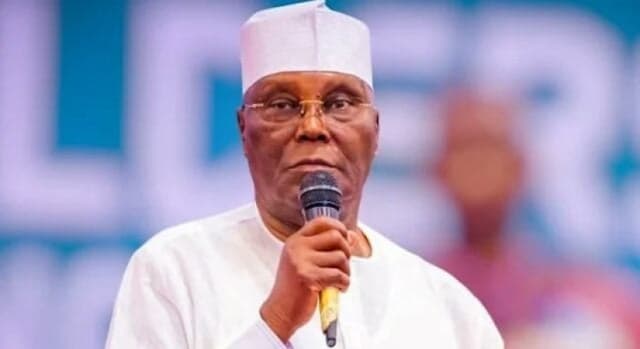
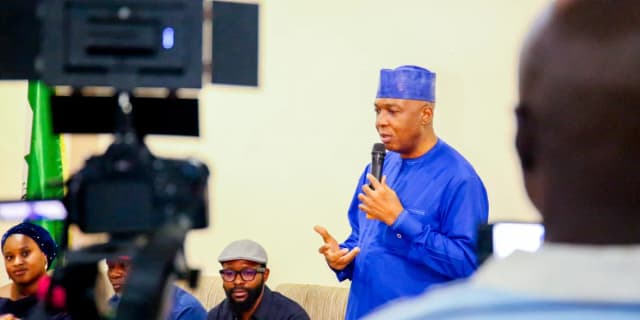
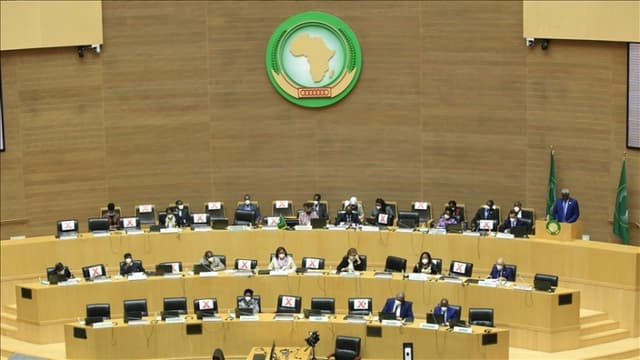




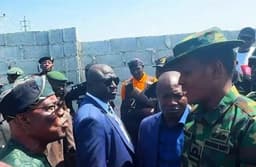
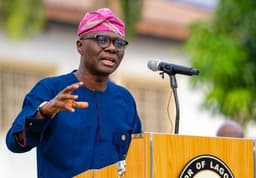











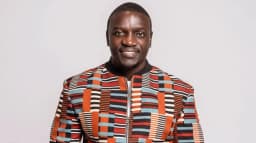

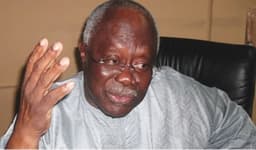
.webp&w=256&q=75)
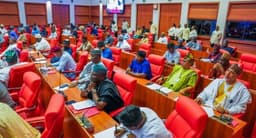


NEWS EXPRESS is Nigeria’s leading online newspaper. Published by Africa’s international award-winning journalist, Mr. Isaac Umunna, NEWS EXPRESS is Nigeria’s first truly professional online daily newspaper. It is published from Lagos, Nigeria’s economic and media hub, and has a provision for occasional special print editions. Thanks to our vast network of sources and dedicated team of professional journalists and contributors spread across Nigeria and overseas, NEWS EXPRESS has become synonymous with newsbreaks and exclusive stories from around the world.

INEC Chairman, Prof Yakubu
Barring any corrective intervention from the National Council of State (NCoS), the international community, civil society organisations and potential election observers (both local and foreign), there are warning signals that the 2027 general elections may turn out to be the worst elections ever conducted in the history of Nigeria, based on verified pieces of information made available to Sunday Vanguard by usually dependable sources within the Independent National Electoral Commission, INEC.
This rigging agenda is a cocktail of plots by politicians who have allegedly infiltrated the system of the election management body with a view to compromising its operations.
Part of the scheme, according to sources familiar with the alleged plots, will be the creation of dual original EC8 result forms, a practice reported to facilitate predetermined outcomes in strategically sensitive polling units, disparities between actual polling units’ results and posts on the INEC Results Viewing Portal, IReV, and manipulation of the ongoing registration exercise, among other things.
Printing of Identical Result Sheets and IReV Compromise
One of the sources said, “This plot involves producing identical Forms EC8A (polling unit), EC8B (ward), and EC8C (local government), one set for public presentation at polling units, and another set reserved for strategic allocation of votes.”
This strategy is to “directly compromise transparency, manipulation of data uploaded to the INEC IReV,” the source claimed.
Sunday Vanguard discovered that a breach of operational protocols is to allow for discrepancies between what was physically recorded and what was transmitted electronically, thus creating structural vulnerabilities in the electoral process.
On INEC’s technological systems, notably IReV and the Bimodal Voter Accreditation System (BVAS), which are designed to enhance transparency and public confidence, Sunday Vanguard was made to understand that “these platforms have been tested in ways exposing them to potential exploitation.”
According to the source, “during off-cycle gubernatorial elections in Kogi (November 2023), Ondo (November 2024) and Edo (September 2024), pre-prepared results were allegedly uploaded to IReV before the closure of polls.”
Civil society observers in Edo documented cases where the votes recorded exceeded the votes of accredited voters, an anomaly suggestive of irregularities.
By-elections after 2023 exhibited similar patterns, including delays or suspension in IReV uploads.
In some cases, alternative “original” result sheets, allegedly prepared by aligned system operatives, were used to finalise outcomes.
Alleged Manipulation of Ongoing Registration
Beyond result management, voter registration procedures have raised additional concerns.
Sunday Vanguard discovered that newly created polling units often contain deliberately low voter populations, enabling the registration of partisan supporters while constraining participation by parties other than the one claiming the unit as a stronghold.
In addition, it was found that limitations on re-registration, replacement of lost PVCs and transfer procedures exacerbate the risks of systematic disenfranchisement.
The paradox Is that INEC has not engaged in massive publicity to enlighten Nigerians about the categories of citizens who should register under this current exercise.
Only those who have attained the age of 18 years after the last exercise in 2022 and those who haven’t registered previously should participate in the ongoing exercise.
Those who have lost their PVC or have a transfer of place of voting shouldn’t register again, but approach INEC for correction.
The reverse is happening simultaneously across Nigeria, collaborating with electoral officers and local government chairmen, leading to stupendously outrageous registration inflation.
Already, INEC claimed it has uncovered 27, 817 multiple registrations from the just-concluded Continuous Voter Registration in Anambra State, despite adding 146,353 new voters to the state voter register.
The Commission disclosed this in a statement issued by its National Commissioner and Chairman, Information and Voter Education Committee, Sam Olumekun, on Thursday in Abuja.
Olumekun said that INEC met on Thursday and, among other issues, deliberated on the final register of voters for the Nov. 8 Anambra governorship election.
In the 2023 general elections, over one million registrations were invalidated due to duplications or errors, coinciding with a turnout of only 26.72%, the worst since.
Shopping For ‘Suitable Replacement’ For Yakubu, Avoiding Buhari’s Mistake
The tenure of the INEC Chairman, Professor Mahmood Yakubu, ends in November, by which time he would have served out his two terms.
As of the time of going to press, Sunday Vanguard investigations revealed that President Bola Tinubu had not boarded on any of the emerging plots to get a ‘suitable replacement’ for Yakubu.
One of the options being pursued by the alleged plotters is the nomination and confirmation of a ‘useful’ individual as Yakubu’s successor.
A number of names (withheld) are already being put forward for consideration.
Unfortunately, a few of the individuals who are being positioned had served as National Commissioners of the Commission, as well as Resident Electoral Commissioners, RECs, did not dress themselves in shining armour during their tenures.
Nigerians recall with nostalgia how the 2003 and 2007 general elections went, culminating in the public admission by a beneficiary of the 2007 sham presidential election, the late President Umar Musa Yar’Adua, that there were flaws.
Some 10 years and two months ago, on Tuesday, June 30, 2015, something very curious happened when President Muhammadu Buhari, who rode on the back of the vigor and determination of Nigerians to engage change, threw INEC into a cesspit of needless controversy, by not appointing a substantive National Chairman for INEC until the tenure of the largely reformative Professor Attahiru Jega ended.
Acting in line with statutes and order of seniority, Jega had handed over to Ambassador (Dr.) Ahmed Wali to head and supervise the activities of the Commissi’n until a substantive Chairman was appointed ”in consultation with the Council of State (NCoS)” – as provided by the Constitution.
However, within 24 hours, Buhari, who had just been sworn-in, barely 36 hours earlier, overruled Jega and appointed a familial, nay filial relation, Mrs Amina Bala Zakari, as acting head of INEC.
The Head of the Civil Service of the Federation at that time, Danladi Kifasi, who conveyed the appointment in a letter, said the appointment was with effect from June 30, 2015 and until the appointment of a substantive Chairman.
At that time, both Wali and Zakari were National Commissioners of INEC.
But in terms of seniority, Wali trumped Zakari.
Interestingly, Buhari, who had been declared winner of the presidential election of March 2015 and who ought to have been briefed by his transition team on appointments he needed to make immediately he assumed office, either had no clue about what was happening in INEC or had made up his mind to appoint a family member as INEC Chairman.
The furore Buhari’s misstep generated in the country at that time threw INEC under the bus.
It was not until Wednesday, October 21, 2015 – almost four months later – that Buhari appointed Yakubu as substantive INEC Chairman, after a series of lobbying and counter-lobbying to get ’suitable’ replacement for Jega.
Why Integrity of INEC Officials is Paramount
The 1999 Constitution, as amended, stipulates procedures for the appointment and removal of INEC’s National Chairman, National Commissioners, and RECs.
The appointment of members to INEC is primarily governed by Section 153(1) and the Third Schedule of the 1999 Constitution, which establishes the Commission and outlines its composition.
Appointments are made by the President, with confirmation by the Senate, and must follow due consultation with the NCoS.
The Constitution and the Electoral Act specify the qualifications and non-partisanship required for appointed members.
However, some of President Bola Tinubu’s appointments did not benefit from the constitutionally required consultation with the NCoS — a number of National Commissioners and Resident Electoral Commissioners have already been appointed, confirmed by the Senate, and sworn-in.
Socio-Economic Rights and Accountability Project, SERAP, has already called out Tinubu on appointing at least three alleged All Progressives Congress, APC, members into the leadership of INEC.
The late former President Muhammadu Buhari also made his appointments to INEC without consulting with the NCoS.
Only the appointments of the former National Chairman of INEC, Professor Attahiru Jega, and some National Commissioners and Resident Electoral Commissioners, RECs, were made in consultation with the NCoS as stipulated by the Constitution.
This negation of constitutional procedure in appointing those to manage Nigeria’s election calls into question the legitimacy of the election management body.
Labour Party: We must be vigilant to protect Nigeria’s democracy
In a reaction to the development, Labour Party (LP) alleged that some political forces were attempting to hijack its structures by infiltrating its ranks just as they were trying to infiltrate INEC.
Interim National Publicity Secretary of the party, Tony Akeni, told Sunday Vanguard that information reaching the party’s headquarters from various states of the federation indicated that the forces were positioning moles to infiltrate the party structure through the scheduled party congresses at the ward, local government, state, zonal and ultimately the national levels.
Akeni said, “We have been made aware of the heinous plot to infiltrate our ranks at all levels to derail our forthcoming congresses.
“Nigerians are also aware of what the current administration has turned our institutions such as INEC into.
“We all out witnesses to what transpired during the by-elections which held in 16 out of the 36 states recently and the manipulation of the ongoing continuous voter registration exercise.
“Our nation cannot afford to have a repeat of the era where the American boxer Mike Tyson, the late pop star, Michael Jackson and Lionel Richie appeared on our voters register.
“As a party, we will continue to urge Nigerian voters to be vigilant. Eternal vigilance, as they say, is the price we all must pay to protect our democracy.
“The body language of INEC, as presently constituted, gives it away as an institution which is only ready to pander to the whims and caprices of the ruling party.
“We can only pray that whosoever is coming into office after the tenure of the current INEC boss expires in November or December is not going throw the confidence of Nigerians down the drain.”
Speaking on the kind of person the LP would like to head INEC in the foreseeable future, the spokesperson said the man or woman must be above board, fair-minded, God-fearing, incorruptible and, above all, possess all that it takes to tell truth to power.
INEC already compromised ahead of 2027 — PDP leader
Also reacting, a member of the PDP National Executive Committee (NEC), warned that the 2027 general elections risked being compromised, saying he wasn’t surprised about allegations being made about the infiltration of INEC, manipulation of voter registration, and lobbying by individuals of all sorts of character to replace the outgoing INEC Chairman.
In an interview with Sunday Vanguard, the NEC member, Timothy Osadolor, who is also the PDP Deputy National, said the electoral body had already shown signs of bias and failure that could render the next polls’ a sham.
“It does not take rocket science to know that the 2027 elections will be a sham, a complete waste of time for Nigerians, and a waste of resources and taxpayers’ money. Unless deep, very deep, and cautious reforms are made in INEC, the future looks bleak,” Osadolor said.
The PDP leader accused politicians of infiltrating INEC to manipulate result sheets and create versions that differ from those posted on the IReV portal.
He also alleged that suspicious figures emerging from the CVR point to preparations to manufacture results ahead of the elections.
“Look at voter registration figures, they are already suspicious. How can Osun State record over 393,000 new registered voters while Kano, Sokoto, and Borno, with far larger populations, struggle to register fewer than 870,000?”, he said.
“These inflated numbers look like a preparation for manufacturing results in 2027”.
Osadolor further claimed that lobbying was underway by individuals of ‘dubious character’ to succeed the INEC Chairman, whose tenure ends in November.
According to him, such moves would weaken the independence of the electoral body and erode confidence in the 2027 polls.
Citing recent elections, he argued that the credibility of the process had already been undermined.
“Now, we are talking about what happened in Rivers State last weekend”, Osadolor said.
”As if that wasn’t offensive enough, we saw the violations in Zamfara and Adamawa during the recent by-elections, where police, soldiers, and even officials outnumbered the registered voters in constituencies. “These were state constituencies, not even federal ones. It turned polling units into war zones”.
He described the last Edo governorship election as ‘the biggest example’ of irregularities, saying the violations there should serve as a case study.
“Sadly, many still treat it as an isolated event. But it is a clear indication that the rule of law and the sanctity of the electoral process have been ruthlessly compromised”.
Osadolor warned that failure to address these problems would entrench impunity and encourage a culture of endless litigation.
“This sets a dangerous precedent. If these things go unchecked, the culture of rushing to court will not only be entrenched, but impunity and disregard for the will of the Nigerian people will also be cemented,” he said.
The PDP NEC member argued that electoral reform must be comprehensive. While supporting the use of technology such as BVAS and card readers, he stressed the need to entrench them in the Constitution and to retrain INEC staff and security operatives.
“The BVAS and card readers must be written into the Constitution. Votes must be transmitted in real time from polling units straight to collation centres, transparently, openly, and beyond manipulation.
“But technology alone is not enough. INEC staff must be retrained and taught to act impartially, neutrally, and competently in the best interests of Nigerians, not for the few oligarchs in power. Security personnel must also remember that the guns they carry are not for any paymaster, but for taxpayers and the Nigerian state,” he said.
Osadolor linked electoral credibility to governance, criticising the ruling All Progressives Congress (APC) government over debt, insecurity, and insensitivity to citizens’ plight.
“Nigeria has endured four years under a clueless, incapable, and insensitive government, a government that does not understand how Nigerians feel.
“On 1st of September, the government claimed it had surpassed all revenue targets. Yet only days earlier, it was begging the World Bank for $1.7 billion. Today, we are one of the most indebted country on the World Bank index. That is both shameful and pitiful,” Osadolor said.
He accused the government of neglecting national security, pointing to killings across several states.
“Even Ukraine, despite being at war for over two years, has not lost as many lives daily as we lose in Maiduguri, Zamfara, Sokoto, and Niger State”, the PDP leader said.
“The slaughter in the Benue Valley and Plateau Hills has become the new normal.
“Meanwhile, those in power feast in the Villa while Nigerians die in their dozens. Does this government have any empathy? Do they even have God in their hearts?”
Osadolor called for urgent reforms, warning that Nigeria’s democracy would “keep sliding backwards” if nothing is done before 2027.
“Some states are posting numbers that can only be described as manufactured. “This is a warning bell to all Nigerians”, he said.
“We must ask: are we preparing for a credible election, or are we simply preparing to cook results? Impunity has become the new normal. And unless we act now, 2027 will be no different”.
Leaders of APC, the ruling party at the federal level, could not be reached for comments at the press time as efforts to reach them were unsuccessful.
‘Lessons from US, Kenya, Ghana, and S/Africa’
Also speaking on the development, Olufemi Aduwo, Permanent Representative, Centre for Convention on Democratic Integrity Ltd/Gte (CCDI) to the United Nations, said comparative international examples underscore this necessity for electoral fidelity.
“In the United States, the Federal Election Commission includes three representatives from each major party to ensure balance and independence, preventing any single party from dominating oversight”, Aduwo said.
“In Kenya, the Independent Electoral and Boundaries Commission involves opposition parties in the appointment vetting process through parliamentary committees, fostering pluralistic oversight and reducing perceptions of bias.
“Ghana’s Electoral Commission consults opposition parties during appointments, enhancing perceived neutrality and inclusivity in decision-making.
“Similarly, South Africa’s Independent Electoral Commission draws candidates from a pool recommended by multi-party parliamentary panels, precluding unilateral executive influence and promoting cross-party consensus”.
He then suggested that “legislation must explicitly prohibit INEC Commissioners or staff, past or present, from accepting political appointments after their tenure for ten years”.
Aduwo continued: “The trajectory of Professor Nentawe Yilwatda, current APC National Chairman, illustrates the risk.
“A career path from INEC Resident Electoral Commissioner to ministerial and then partisan positions undermines neutrality.
“This principle parallels restrictions on retired judges under the Legal Practitioners Act, preserving institutional independence.”
INEC’s Yakubu and Promises
Before a global audience at Chatham House, on Tuesday, January 17, 2023, INEC Chairman, Professor Mahmood Yakubu, had boasted about the near inviolability of BVAS and IReV.
Yakubu said: “To avoid the usual challenges with the application of new election technologies, the Commission introduced and tested our innovations for the election early enough.
“There are three critical components namely, the INEC Voter Enrollment Device (IVED) for improved registration of voters, the Bimodal Voter Accreditation System (BVAS) for both voter accreditation and e-transmission of results for collation and the INEC Result Viewing (IReV) portal to offer the public access to view Polling Unit results.
“For the BVAS and IReV, we initially deployed it on a pilot basis in several bye-elections and off-cycle governorship elections.
“The IReV was used in the governorship elections in Edo State (September 2020) and Ondo State (October 2020).
“A combination of both BVAS and IReV was used in Anambra State (November 2021), Ekiti State (June 2022) and Osun State (July 2022). “The BVAS was also used in the Area Council elections in the Federal Capital Territory (FCT) in February 2022.
“Deploying this technology in these major elections afforded the Nigerian public and the Commission opportunities to get acquainted with the device and to review its performance to enhance it towards the general election.
“For the Commission, several lessons have been learnt from these deployments and we believe that we are ready to deploy these technologies for the general election.”
It did not end there.
Again, following a painstaking investigation by Vanguard, a story was published on Monday, November 21, 2022, titled, ‘How politicians still threaten credible polls – INEC Source’.
See link: www.vanguardngr.com How politicians still threaten credible polls — INEC source
Yakubu came out to discredit the story.
Relying on IReV Portal printouts from the Anambra governorship election of 2021, the exclusive report by Vanguard warned INEC of the potential for doubt should the Commission not transmit results to IReV, in real-time.
In trying to wave the report aside, the INEC boss told Nigerians: “On this note, let me seize this opportunity to respond to a story emanating from a section of the media that the Commission has decided to jettison the uploading of polling unit results in real time on Election Day.
“It should be disregarded as fake news.
“The Commission will upload polling unit-level results and citizens will have access to these results in real-time as they upload from polling units.
“This innovation was introduced by the Commission and the Commission cannot turn around and undermine itself.
“This technology has come to stay, we will upload polling unit results and citizens will have the right to view these results. After all, we are serving the citizens.
“How can we deny citizens access to the results of the process conducted by them at the polling unit?
“I want to reassure you that the 2023 election is going to be our best election and we are committed to ensuring that votes cast by Nigerians will determine the outcome of elections, nothing more, nothing less.”
Unfortunately for Yakubu, he neither came through for Nigerians on that score but his Commission claimed there was a glitch in its operations regarding IReV.
This report is another alarm bell meant to draw the attention of stakeholders and stockholders in the coming 2027 general election. (Sunday Vanguard)